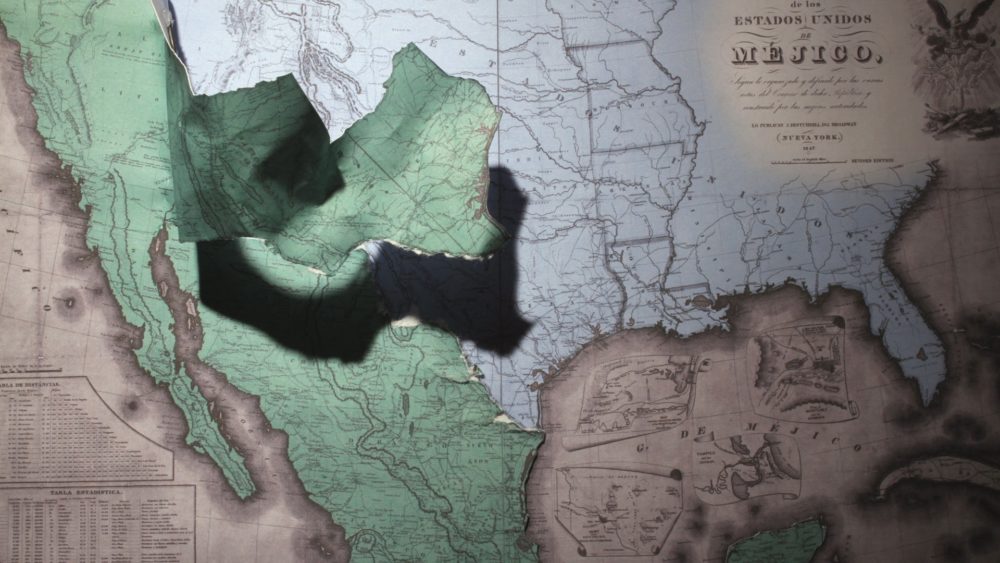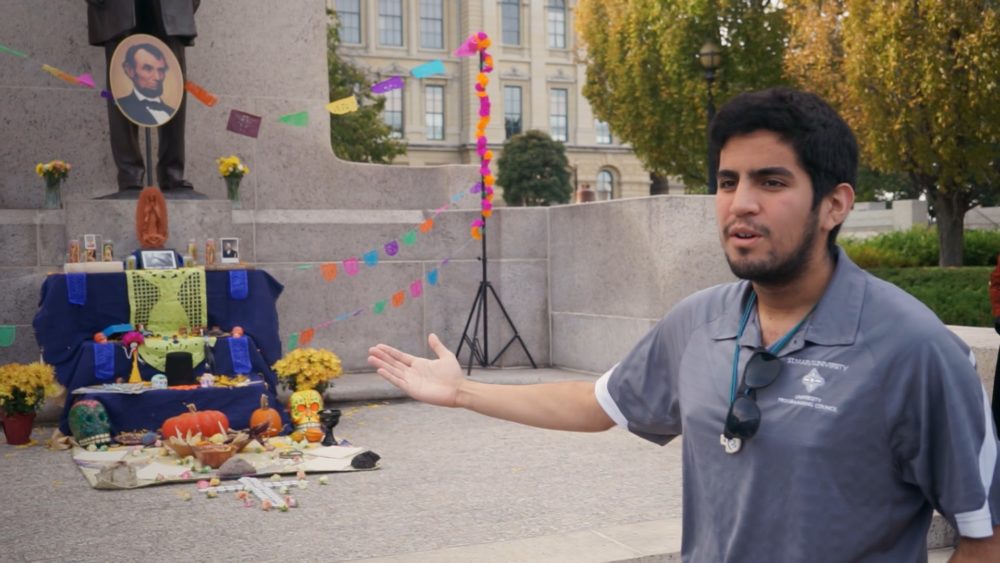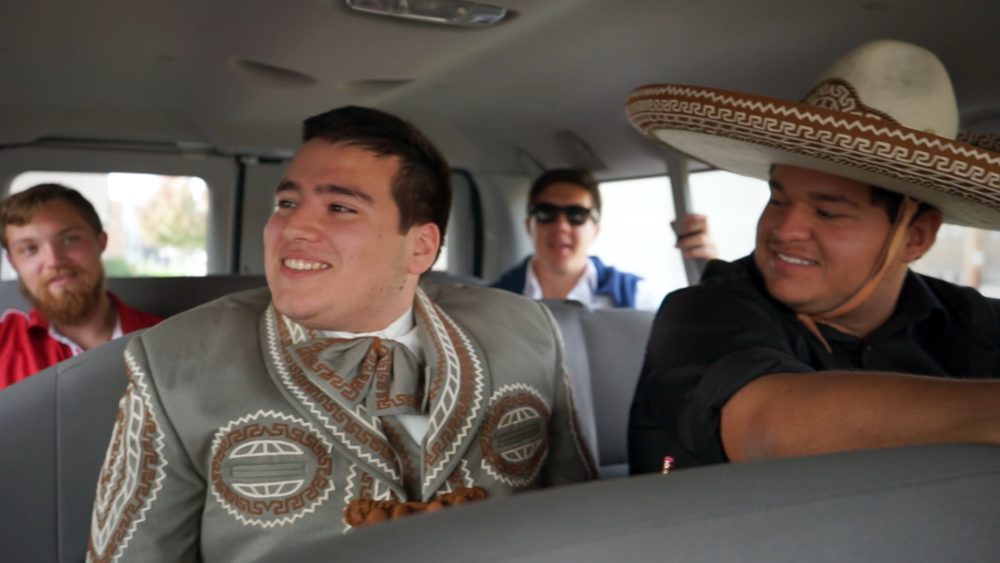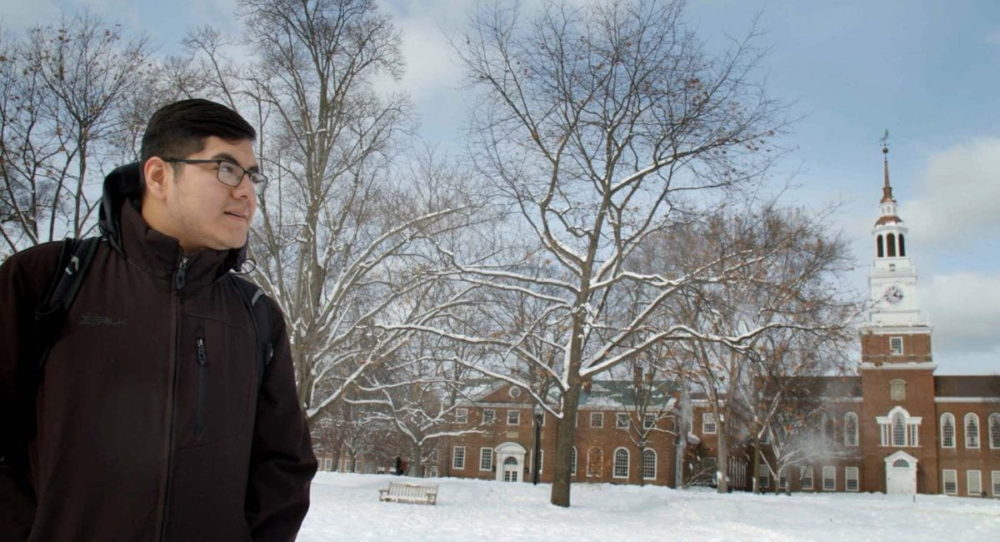Advertisement
At The Boston Latino International Film Fest, 2 Documentaries Show College Students Changing History
History can be an uninspiring subject in college classrooms. Many interpretations lopsidedly memorialize victors and use phrases that offend. But when the effects of skewed history play out on our national and international stage, it becomes harder to ignore.
Two short documentary films, screening as part of the Boston Latino International Film Festival on Saturday, Sept. 28, reveal what happens when college students feel history’s persistent divisions in the present tense. Both “25 Texans In The Land Of Lincoln” and “Change The Subject” document how students took concerns to decision makers in capital cities — Springfield, Illinois and Washington, D.C., respectively. Along the way they encounter unexpected allies and naysayers.
In the case of “25 Texans In The Land Of Lincoln,” a history class of predominantly Mexican-American undergraduates from St. Mary’s University in San Antonio road trips to Illinois. They intend to ask the Illinois State Military Museum to repatriate a key museum attraction, General Santa Anna’s wooden leg. At minimum they hope to have a conversation. With an upbeat score (by Berklee composer Claudio Ragazzi) and student interviews full of relaxed optimism, the film chronicles how the students got to this point.

In American history books, and in Texas especially, Santa Anna is often cast as the vicious Mexican ruler who overtook the Alamo. The film shows how the students host a mock trial to prepare for the road trip — one team reiterates these familiar accusations of him while the other defends the general, who served as Mexico’s president 11 times. One student, it turns out, is his descendant.
The filmmaker, Cambridge's Ellen Brodsky, says that she first learned of the students’ plans from their professor, Teresa Van Hoy, who happens to be a family friend. "[Van Hoy] believes a lot of pain and hurt can be addressed by delving into history," says Brodsky — and that was enough to motivate her to start the film. However, she confesses she had a lot to learn. “I didn’t understand the relationship between slavery, abolitionism and the U.S. Mexican War,” Brodsky says.
In addition to examining Santa Anna from all sides, Brodsky filmed the students studying Abraham Lincoln’s opposition to the Mexican-American War as an extension of his stance against slavery. In Illinois, she shows them setting up a Day of the Dead altar in Lincoln’s honor.

To give a sense of the scope of the Mexican-American War, Boston-based animators Daniel Rowe and Maya Erdelyi animated images from famous paintings found in history textbooks, like John Gast's "American Progress," onto a map. The paper map tears apart to show how Tejas becomes Texas. “I really wanted the violence of ripping the map,” says Brodsky, who conducted research at the Leventhal Map Center at Boston Public Library.
The documentary follows the students to Springfield and the tense scene that unfolds once they finally arrive at the museum. Brodsky needed to obscure the identities of museum staff in that scene. She says that the students attended several other events in Springfield, meant to be educational and conversational, but participants would not allow her camera in. Brodsky says that there was “a nervousness in Springfield that started to spread” before the students arrived. “I was so accustomed to hearing Teresa [Van Hoy] say history can heal… but it was so visceral, the experience of history being dangerous,” she says.

Brodsky says she struggled with not casting anyone as too much a hero or villain. As Van Hoy tells her students in the film, “We’ve outgrown that.”
“25 Texans” screens free at the BPL, where Leventhal’s current (and related) exhibit focuses on mapping the U.S. as it expanded westward from 1800-1862. St. Mary's University student Priscila Reyes will join Brodsky and others for a panel discussion.
In the case of “Change The Subject,” Dartmouth College students confront use of a phrase they think should be a relic. However offensive and inaccurate, “illegal alien” is a current search term of the Library of Congress, and thus is used by more than 12,800 public and college libraries throughout the United States to seemingly search more efficiently. Undergraduate Melissa Padilla discovered this while seeking research help from Dartmouth Latin American Studies librarian Jill Baron.
In a phone interview, Padilla says she vividly recalls seeing the word “illegal” over and over and thinking, “That really hurts. Why doesn’t this place do better?” But that encounter is why the pair decided to work together on the film along with then-staff Sawyer Broadley and then-student Óscar Rubén Cornejo Cásares.

Padilla describes her first years at Dartmouth as naïve and idealistic. “I was in my own world,” she says. She was also undocumented. But her perception of higher education as a safe haven slowly began to crumble.
The film is as much about shattering the mystique of elite institutions (and their laws) as it is about Padilla, Baron and others’ fight to petition the Library of Congress to change the term to “undocumented immigrant.” En route to the capital they pick up national support, especially within the librarian community. Their petition also causes a heated, highly partisan national debate. The film uses news clips to argue that President Trump has increased the use of the word “illegals” to describe immigrants as a political strategy.
With her degree now in hand, Padilla says that making this film helped her find allies in unlikely places. She says initially she didn’t trust working with librarians like Baron, who in the film acknowledges her own white privilege. “Honestly, it’s about those tiny battles,” says Padilla. “Knowing that people outside your community are willing to step out and brave the fight with you.”
“25 Texans In The Land Of Lincoln” screens at 2 p.m. and “Change The Subject” at 3:15 p.m. for free at Boston Public Library on Saturday, Sept. 28. The Boston Latino International Film Festival runs from Sept. 25-29 at various venues.
